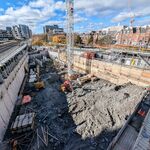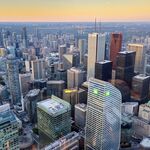Which is why hosting the games would mean displacing hundreds, possibly thousands, of homes and businesses. Which is exactly what has happened in every host city.
The IOC does not care what kinds of development would be good for the host city. Once the host city contract is signed, the IOC calls the shots. It overrides the laws, ALL of the laws. The local community has no recourse whatsoever to stop unwanted development.
There is literally no point in imagining how the games would be good for Toronto's development. We would get what the IOC decides.
The Sydney Olympic Park was a failed High Tech industrial park and former industrial wasteland. Net improvement there for sure.
The Athens Olympic Park was built for the Mediterranean Games in 1991, and was merely renovated for the 2004 games. Located in a suburb of Athens, but accessible by Metro.
The London Olympic Park (now the Queen Elizabeth Olympic Park) was built on a mixture of greenfield and brownfield lands (the greenfield being part of the Hackney Marshes). Located in East London (again, not downtown). Was coordinated with the Stratford City development project. Again, a net plus compared to the brownfield that existed there previously.
Atlanta did not have a formal Olympic Park, but the main Olympic Stadium was built in the parking lot of the old Fulton County Stadium (former home of the Braves). The site of that stadium then became the parking lot for what is now Turner Field.
Rio plans on holding events in 4 smaller clusters around the City, with no formal central Olympic Park. In fact, the Opening and Closing ceremonies will not even be held at the same location. Most of the venues are already existing, with only a few for the specialized sports (cycling, canoe/kayak, etc) being built specifically for the games.
The one real exception on the list in the Beijing Games in 2008. I purposely left them off this list because, well, 'one of these things is not like the other'. A Communist government can do pretty much whatever they want, and it's well-recongnized that China really went over the top for their games. Not really a useful case study for what can reasonably be done in a democratic country.
So in summary, it seems that recent Olympics (1996 onwards), have been quite accommodating for the cities they're hosted in. Most of the locations were in brownfield lands outside of the city centre, yet still accessible by highways and transit. Not located in far-flung suburbs, but not right smack downtown either. Kinda sounds like Downsview to a tee, doesn't it?
Last edited:





